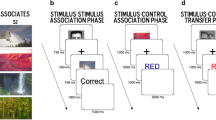Abstract
Two experiments investigated priming in free association, a conceptual implicit memory task. The stimuli consisted of bidirectionally associated word pairs (e.g.,beach-sand) and unidirectionally associated word pairs that have no association from the target response back to the stimulus cue (e.g.,bone-dog). In the study phase, target words (e.g.,sand, dog) were presented in an incidental learning task. In the test phase, participants generated an associate to the stimulus cues (e.g.,beach, bone). In both experiments, priming was obtained for targets (e.g.,sand) that had an association back to the cue, butnot for targets (e.g.,dog) for which such a backward association was absent. These results are problematic for theoretical accounts that attribute priming in free association to the strengthening oftarget responses. It is argued that priming in free association depends on the strengthening of cuetargetassociations.
Similar content being viewed by others
References
Anderson, J. R. (1983). A spreading activation theory of memory.Journal of Verbal Learning & Verbal Behavior,22, 261–295.
Basden, B. H., Basden, D. R., &Gargano, G. J. (1993). Directed forgetting in implicit and explicit memory tasks: A comparison of methods.Journal of Experimental Psychology: Learning, Memory, & Cognition,19, 603–616.
Blaxton, T. A. (1989). Investigating dissociations among memory measures: Support for a transfer appropriate processing framework. Journal of Experimental Psychology: Learning, Memory, & Cognition,15, 657–668.
Burnage, G. (1990).CELEX: A guide for users. Nijmegen: SSN.
Cabeza, R. (1994). A dissociation between two implicit conceptual tests supports the distinction between types of conceptual processing.Psychonomic Bulletin & Review,1, 505–508.
De Groot, A. M. B. (1980).Mondelinge Woordassociationormen: 100 woordassociaties op 460 Nederlandse zelfstandige naamwoorden [Oral word association norms: 100 word associations to 460 Dutch nouns]. Lisse, The Netherlands: Swets & Zeitlinger.
Diamond, R., &Rozin, P. (1984). Activation of existing memories in anterograde amnesia.Journal of Abnormal Psychology,93, 98–105.
Graf, P., &Mandler, G. (1984). Activation makes words more accessible, but not necessarily more retrievable.Journal of Verbal Learning & Verbal Behavior,23, 553–568.
Graf, P., Shimamura, A. P., &Squire, L. R. (1985). Priming across modalities and priming across category levels: Extending the domain of preserved function in amnesia.Journal of Experimental Psychology: Learning, Memory, & Cognition,11, 386–396.
Graf, P., Squire, L. R., &Mandler, G. (1984). The information that amnesic patients do not forget.Journal of Experimental Psychology: Learning, Memory, & Cognition,10, 164–178.
Humphreys, M. S., Bain, J. D., &Pike, R. (1989). Different ways to cue a coherent memory system: A theory for episodic, semantic and procedural tasks.Psychological Review,96, 208–233.
Jacoby, L. L., &Dallas, M. (1981). On the relationship between autobiographicalPsychology: Learning, Memory, & Cognition,13, 306–340.
Kučera, H., &Francis, W. N. (1967).Computational analysis of present-day American English. Providence, RI: Brown University Press.
Lauteslager, M., Schaap, T., &Schievels, D. (1986).Schriftelijke woordassociatienormen voor 549 Nederlandse zelfstandige naamwoorden [Written word association norms for 549 Dutch nouns]. Lisse, The Netherlands: Swets & Zeitlinger.
McNamara, T. P. (1992). Theories of priming: I. Associative distance and lag.Journal of Experimental Psychology: Learning, Memory, & Cognition,18, 1173–1190.
Morton, J. (1969). Interaction of information in word recognition.Psychological Review,76, 163–178.
Nelson, D. L., McEvoy, C. L., & Schreiber, T. A. (1994).The University of South Florida word association, rhyme and word fragment norms. Unpublished manuscript.
Rappold, V. A., &Hashtroudi, S. (1991). Does organization improve priming?Journal of Experimental Psychology: Learning, Memory, & Cognition,17, 103–114.
Roediger, H. L., III (1990). Implicit memory: Retention without remembering.American Psychologist,45, 1043–1056.
Roediger, H. L., III, &McDermott, K. B. (1993). implicit memory in normal human subjects. In F. Boller & J. Grafman (Eds.),Handbook of neuropsychology (Vol. 8, pp. 63–131). Amsterdam: Elsevier.
Roediger, H. L., III,Weldon, M. S., Stadler, M. L., &Riegler, G. L. (1992). Direct comparison of two implicit memory tests: Word fragment and word stem completion.Journal of Experimental Psychology: Learning, Memory, & Cognition,18, 1251–1269.
Salasoo, A., Shiffrin, R. M., &Feustel, T. C. (1985). Building permanent memory codes: Codification and repetition effects in word identification.Journal of Experimental Psychology: General,114, 50–77.
Shimamura, A. P., &Squire, L. R. (1984). Paired-associate learning and priming in amnesia: A neuropsychological study.Journal of Experimental Psychology: General,113, 556–570.
Storms, L. H. (1958). Apparent backward associations: A situational effect.Journal of Experimental Psychology,55, 390–395.
Vaidya, C. J., Gabrieli, J. D. E., Keane, M. M., &Monti, L. A. (1995). Perceptual and conceptual memory processes in global amnesia.Neuropsychology,9, 580–591.
Vaidya, C. J., Gabrieli, J. D. E., Keane, M. M., Monti, L. A., Gutiérrez-Rivas, H., Zarella, M. M. (1997). Evidence for multiple mechanisms of conceptual priming on implicit memory tests.Journal of experimental Psychology: Learning, Memory & Cognition,23, 1324–1343.
van Loon-Vervoorn, W. A., &Van Bekkum, I. J. (1991).Woordassociatie lexicon [Word association lexicon]. Lisse, The Netherlands: Swets & Zeitlinger.
Weldon, M. S., &Coyote, K. C. (1996). Failure to find the word picture superiority effect in implicit conceptual memory tests.Journal of Experimental Psychology: Learning, Memory, & Cognition,22, 670–686.
Author information
Authors and Affiliations
Corresponding author
Additional information
The research reported in this article was supported by Grant 575-56072 of the Foundation for Behavioral and Educational Sciences of the Netherlands Organization for Scientific Research.
Rights and permissions
About this article
Cite this article
Zeelenberg, R., Shiffrin, R.M. & Raaijmakers, J.G.W. Priming in a free association task as a function of association directionality. Mem Cogn 27, 956–961 (1999). https://doi.org/10.3758/BF03201226
Received:
Accepted:
Published:
Issue Date:
DOI: https://doi.org/10.3758/BF03201226




